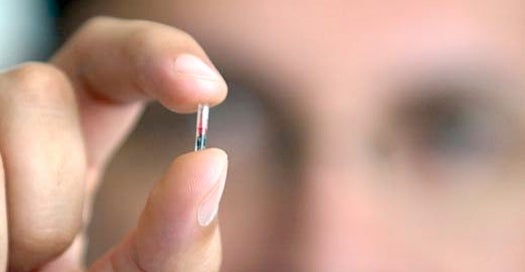Text Messages from a Microchip on Your Shoulder Remind You to Take Your Pills
Chip-on-a-shoulder sends nagging text messages to patients who fail to follow doctors' orders

A text-messaging microchip planted on the patient’s body significantly boosts compliance with doctor’s prescriptions, according to pharmaceutical giant Novartis. That’s good news for patient health and reining in healthcare costs, but a potentially worrisome development for privacy advocates.
Patients taking a drug for lowering blood pressure also received two additional gifts: tiny microchips within each pill and a shoulder-attached sensor patch.
Mobihealthnews explained how stomach acid surrounding the ingested pills generates an electric charge, and that signals the shoulder patch.
The patch dutifully records the time and date when a patient takes each pill, so that it can give its wearer a cell phone buzz when it’s time to take the next pill. Other information, such as heart rate, activity and breathing patterns, are also transmitted to the cell phone and onto the Internet — a form of extreme patient transparency for watchful caregivers.
The Financial Times reports that the 20 guinea pig patients improved their compliance from 30 percent to 80 percent after half a year. Novartis might expand its approach by striking an exclusive deal with chip supplier Proteus Biomedical.
Medical technology has long moved toward greater monitoring capabilities, whether patients are in an operating room or out jogging on the trail. Growing numbers of smart cell phones have also permitted doctors and patients alike to gauge personal health in unprecedented ways.
Still, future patients may find it somewhat unnerving to get nagging reminders from that chip on their shoulder — especially when they know the guys in white coats aren’t far behind.